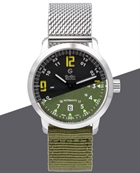WHAT IS THE DIFFERENCE BETWEEN A MECHANICAL WATCH AND A QUARTZ WATCH?

A quartz and an automatic movement side by side
When selecting your watch, you will have the choice between two types of movements: quartz powered by a battery or mechanical powered by a spring (manual or automatic).
What are the major differences between these types of movements?
What are the advantages and disadvantages of each of them?
GriGri Watches helps you to see more clearly.
Follow the guide!
QUARTZ WATCHES
Quartz watches are nowadays the most popular and widespread. How do they work?
A thin quartz plate is oscillated at a stable frequency by the electrical pulse of a battery, which allows the hands to rotate regularly. This type of movement is generally suitable for thin watches and women's watches.
Advantages :
Find our selection of customizable quartz watches on grigri.com.
MECHANICAL WATCHES
Mechanical watches are generally appreciated by collectors and watch experts for the beauty of the mechanism and the technical prowess. Unlike quartz watches, they do not draw their energy from a battery.
Among them, we distinguish between hand-wound and self-winding watches.
The manual winding which must be carried out regularly by turning the crown so that the watch functions correctly.
The automatic winding which must be carried out regularly by wrist movements. If you do not wear your automatic watch daily, using a winding device that simulates wrist movements may be a solution. Otherwise, an automatic watch can also be wound manually by turning the crown.
To learn more about the winding process of a mechanical watch, do not hesitate to consult the article dedicated to this topic.
Advantages :
Disadvantages :
It should be noted that GriGri Watches only offers automatic (and not manual) mechanical watches. Find our selection of customizable automatic watches on grigri.com.
Thus, the choice of movement depends on your budget, your desires and your needs. Are you still hesitating? Feel free to contact us by email or via messenger. We will be happy to help you find the right watch for you!
What are the major differences between these types of movements?
What are the advantages and disadvantages of each of them?
GriGri Watches helps you to see more clearly.
Follow the guide!
QUARTZ WATCHES
Quartz watches are nowadays the most popular and widespread. How do they work?
A thin quartz plate is oscillated at a stable frequency by the electrical pulse of a battery, which allows the hands to rotate regularly. This type of movement is generally suitable for thin watches and women's watches.
Advantages :
- The price is often more affordable than a mechanical watch
- The finesse of the movements (compared to a mechanical watch)
- The accuracy is formidable - a few seconds per month only
- The resistance of such a movement is impressive, it is more resistant to shocks and vibrations. It is therefore ideal for sports and domestic activities
- Maintenance is limited to changing the battery every two years or so
- The durability of the watch is limited by the wear and tear of the electronic components
- The prestige of the watch is not the same as a mechanical movement. Thus, some brands choose not to offer quartz watches for fear of damaging their image.
Find our selection of customizable quartz watches on grigri.com.
MECHANICAL WATCHES
Mechanical watches are generally appreciated by collectors and watch experts for the beauty of the mechanism and the technical prowess. Unlike quartz watches, they do not draw their energy from a battery.
Among them, we distinguish between hand-wound and self-winding watches.
The manual winding which must be carried out regularly by turning the crown so that the watch functions correctly.
The automatic winding which must be carried out regularly by wrist movements. If you do not wear your automatic watch daily, using a winding device that simulates wrist movements may be a solution. Otherwise, an automatic watch can also be wound manually by turning the crown.
To learn more about the winding process of a mechanical watch, do not hesitate to consult the article dedicated to this topic.
Advantages :
- The case which reveals the cogs and the finesse of the mechanism thanks to a transparent back
- The durability of this type of movement, which, if well maintained, can be passed on from generation to generation
- The display is more pleasant, with a more fluid movement of the hands
- The prestige of such a watch is well established, combining tradition, know-how and authenticity
Disadvantages :
- The sensitivity to shocks is more important
- The maintenance of your mechanical watch is necessary regularly (every 2 to 5 years), and can be particularly expensive
- Prices are significantly higher than quartz watches
- The accuracy of mechanical watches is less important – a delay of more or less four minutes per month in advance or delay
It should be noted that GriGri Watches only offers automatic (and not manual) mechanical watches. Find our selection of customizable automatic watches on grigri.com.
Thus, the choice of movement depends on your budget, your desires and your needs. Are you still hesitating? Feel free to contact us by email or via messenger. We will be happy to help you find the right watch for you!







